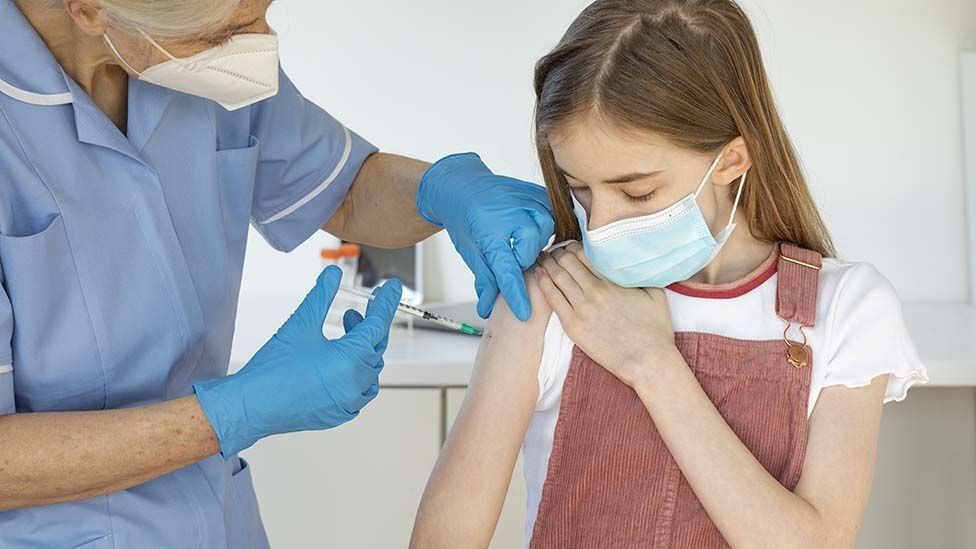Parents are always looking out for their children’s best interests, and making the decision to vaccinate kids and teens against COVID-19 is no exception. They see that the dangers of the virus are real: Two years into a global pandemic that has turned the world upside-down, case numbers and hospitalizations are still high. And in January 2022 alone, more than 3.5 million children and adolescents were infected with the virus.
But some parents are still asking questions about whether it makes sense for their children to get the vaccine — and that’s OK. It’s important to ask questions and to get answers from trusted sources like pediatricians and other health care providers.
Here are answers to some of the most frequently asked questions.
1. Why is it important for kids to be vaccinated against COVID-19?
You may have heard that children are less likely to develop severe symptoms from COVID-19 than adults. That’s true. However, they can still catch the virus, get sick and spread it to others. COVID-19 is just as contagious to kids and teens as it is to adults, and the latest variants are even more contagious than the original form of the virus.
Many pediatricians are seeing an increase in the number of children with COVID-19 or post-COVID symptoms that they need to care for. Being vaccinated against COVID-19 helps give children strong protection against the potential serious illness or complications, so that children and their families can have greater peace of mind as they move about in a world where the virus is still a threat.
“As we approach the two-year anniversary of the pandemic, cases of COVID-19 among children and adolescents are the highest we have ever seen,” said Dr. Moira Szilagyi, president of the American Academy of Pediatrics. “Wearing masks in public, isolating when sick and vaccinating as many people as possible are critical ways we can all help contain the spread of this virus, prevent hospitalizations and protect those who are most vulnerable. That includes children in the youngest age group of children, who still are waiting for a vaccine.”
2. How do we know that these vaccines are safe for kids?
The COVID-19 vaccine effort has been watched incredibly closely — perhaps more closely than any other public health effort in U.S. history. Many parents also don’t realize that the vaccine dose for younger ages is actually smaller to help ensure it’s as safe as possible. Clinical trials included thousands of children and found the vaccines to be safe and effective. Since then, millions of children and teens have also been vaccinated safely. The FDA ensured that each authorized COVID-19 vaccine was studied for at least eight weeks after the final dose to examine possible side effects. The eight-week timeline was chosen because side effects from any vaccines almost always present themselves within six weeks of getting the shot, so this is an excellent indication of the COVID-19 vaccine’s overall safety.
Studies have shown that for children ages 5 to 11, severe side effects are rare. Some people may experience mild short-term side effects including pain at the injection site, headaches, fever or muscle aches after being vaccinated. However, these side effects should go away within a few days and it is unlikely that children would experience any serious or long-term side effects.
“Through a global effort in the science community, COVID vaccines became the highest priority to help save lives in the pandemic,” said Szilagyi. “With a high level of scrutiny in testing, ongoing monitoring and now with millions of people fully vaccinated in this country, including children, we know these vaccines are safe. My own grandchildren have been vaccinated against COVID-19, and I recommend the vaccine to my patients because I know it is the best tool we have in the toolbox to protect them from severe disease.”
3. Are the vaccines and boosters effective against the latest COVID-19 variants?
New variants have led to more “breakthrough infections,” where even those who are fully vaccinated are getting infected with COVID-19. However, authorized vaccines and booster shots continue to provide strong protection against severe symptoms and hospitalization, even for these new variants. Fully vaccinated people are less likely to experience serious illness, be hospitalized or transmit the virus to others. Immunizing kids helps keep them safe and is an important part of getting back to a sense of normalcy in kids’ lives.
“The good news is that we know much more about this virus than we did two years ago, and we have more tools at our disposal,” said Szilagyi. “We understand the disease and how best to isolate and care for infected patients. We have access to masks and other personal protective equipment. And we have a vaccine that offers strong protection against severe illness, even with Omicron.”
4. Is there a risk of heart inflammation in kids who have been vaccinated?
Myocarditis (inflammation of the heart muscle) is rare among children who receive the vaccine. But it’s important to remember that if a person becomes infected with COVID-19, myocarditis is one of many potential complications. Medical experts believe that the risk of severe complications from contracting the virus far outweigh the potential risks of a rare adverse reaction to the vaccine.
Among the hundreds of millions of vaccine doses given, the reports of myocarditis are quite rare. Those rare cases associated with the vaccine have been reported mostly among male adolescents and young adults. And those who do develop myocarditis typically respond well to medicine and rest and feel better quickly.
5. If my child has already gotten COVID-19, should they still get vaccinated?
Simply put: yes. Health experts recommend vaccinating your child even if they have already had COVID-19. While it’s true that children who have recovered from a previous COVID-19 infection likely benefit from some level of immunity, that immunity can be limited. It is possible for both kids and adults to be infected by the virus again, and vaccinations offer an extra layer of protection in case this happens.
Additionally, studies suggest that immune protection offered by vaccines is more consistent, more predictable and generates a stronger antibody response.
“The American Academy of Pediatrics recommends that everyone over the age of 5 be vaccinated against COVID and that everyone over the age of 12 receive a booster even if they had a previous COVID infection,” said Szilagyi. “I encourage parents to bring any questions they have about the vaccine to their child’s pediatrician. Pediatricians are eager to have these conversations.”
Have more questions? Talk to your pediatrician.
If you still have questions about vaccinating your child against COVID-19, don’t hesitate to reach out to your pediatrician. They’re the ones who know your child best, and they can speak with you in detail about the benefits of vaccination for your child and your whole family.











